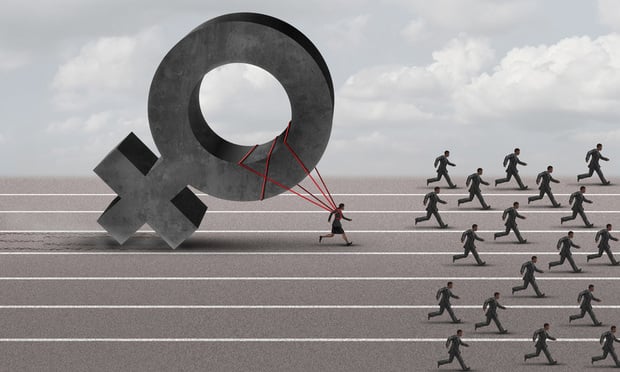What Does 'Weinstein Effect' Mean for Law Firms Facing Gender Discrimination Claims?
While Big Law has avoided being rocked by sexual misconduct claims in recent months, the steady stream of revelations in other industries has heightened the risks associated with a potential claim against a law firm.
December 07, 2017 at 06:49 PM
5 minute read

At a time when a wave of sexual harassment and misconduct claims against high-profile men has roiled politics, the media and a variety of industries, law firms are suddenly contending with the reputational and legal risks associated with a potential claim of sexual misconduct or gender discrimination.
Even the handling of legal work for a man accused of sexual misconduct in this environment of heightened awareness can have a negative impact on a firm. Prominent lawyers and large law firms have yet to become direct targets of lawsuits alleging sexual harassment, but a law firm facing claims of any kind of gender discrimination could be at risk.
This means firms under scrutiny for gender discrimination based on pay equity or promotion may consider settling early if they fear there's a chance that harassment allegations would come to light during the course of litigation, according to lawyers who have either litigated employment claims against law firms or study the legal profession.
“I don't counsel corporate clients, so I don't know firsthand that they're worried, but they damn well better be because there are consequences,” said Lori Andrus of Andrus Anderson, a lead lawyer for a former Steptoe & Johnson LLP associate embroiled in litigation accusing that firm of gender discrimination involving pay disparities.
The widespread public discussion surrounding harassment issues, and developments like the “#MeToo” movement in social media, have created an environment in which women who step forward with accusations of misconduct will be believed in a way they often haven't been in the past, said Deborah Rhode, director of the Center on the Legal Profession at Stanford Law School.
“I think the current climate is going to empower more women to come forward because they see there are fewer professional [consequences],” Rhode said. “People are being believed and they aren't being dismissed as whiners who can't make it on the merits.”
The legal industry is not immune to issues related to sexual harassment, although complaints do not arise as much there as in some other sectors, such as pharmaceutical sales and the hospitality industry, according to employment lawyers.
This could be in part a result of the law firm world having taken steps to clean up its act on the sexual harassment front earlier than some other industries, Rhode said. She pointed to a high-profile sexual harassment lawsuit from the 1990s in which Baker McKenzie was hit with a $3.8 million judgment after a former secretary at the firm alleged she was groped by a former partner. (The partner, Martin Greenstein, left Baker McKenzie in 1993 and has since run his own boutique intellectual property firm, according to his profile on LinkedIn.)
“My own sense is that one reason you haven't seen lawyers figuring so prominently in the lists of men behaving badly is that they got a wake-up call somewhat earlier,” Rhode said.
But large law firms have suffered from pay and promotion disparities between men and women lawyers. And several firms, including the former Chadbourne & Parke, Proskauer Rose and Winston & Strawn, currently face gender discrimination lawsuits alleging unequal pay.
And not all firms come out looking squeaky clean on the sexual harassment front. Some of those gender bias cases also make harassment claims. A Jane Doe complaint against Proskauer, for instance, references comments that senior partners allegedly made about Doe's appearance. But the cases have stopped short of making the egregious types of sexual misconduct claims that have been leveled against such figures as film producer Harvey Weinstein and former NBC television personality Matt Lauer.
Even putting aside the harassment allegations, the law firm complaints tend to describe a male-dominated atmosphere, which the plaintiffs allege contributed to lower pay and fewer promotion and business generation opportunities for women lawyers.
Harassment and pay equity are on the surface distinct issues, but they often arise from a similar underlying environment, Andrus said.
“The suppression of women's wages is tied to the suppression of women's power, and I think that's true in the legal world,” said Andrus. “We are only 5 percent of managing partners and that number hasn't moved in a decade.”
There's also a question of a possible spillover effect: whether the recent stream of public, high-profile harassment accusations in other industries could affect law firms that face gender discrimination claims now or at some point in the future.
David Sanford of Sanford Heisler Sharp, who represents current and former women partners in the Chadbourne and Proskauer lawsuits but also handles many employment disputes outside of court, said he's seen signs in recent weeks that employers of different stripes might be more interested now in striking global settlements that would resolve both a pay equity dispute and a harassment claim. So in his view, the current public mood surrounding harassment issues is most likely to affect a pay equity case if it also includes some sort of harassment claim.
“I don't think there's necessarily spillover impact on [pay discrimination cases] unless it turns out there are instances of sexual harassment claims to be brought,” he said.
Rhode said she'll be watching the pending gender bias suits in the law firm world and elsewhere to see whether they move more quickly toward a settlement now, as opposed to how they might have been handled before the cascade of sexual misconduct revelations.
“I think this is not a good time to be a defendant in a case involving gender discrimination,” she said.
This content has been archived. It is available through our partners, LexisNexis® and Bloomberg Law.
To view this content, please continue to their sites.
Not a Lexis Subscriber?
Subscribe Now
Not a Bloomberg Law Subscriber?
Subscribe Now
NOT FOR REPRINT
© 2025 ALM Global, LLC, All Rights Reserved. Request academic re-use from www.copyright.com. All other uses, submit a request to [email protected]. For more information visit Asset & Logo Licensing.
You Might Like
View All
Will a Market Dominated by Small- to Mid-Cap Deals Give Rise to a Dark Horse US Firm in China?


'Ridiculously Busy': Several Law Firms Position Themselves as Go-To Experts on Trump’s Executive Orders
5 minute read
The Law Firm Disrupted: For Office Policies, Big Law Has Its Ear to the Market, Not to Trump
Trending Stories
Who Got The Work
J. Brugh Lower of Gibbons has entered an appearance for industrial equipment supplier Devco Corporation in a pending trademark infringement lawsuit. The suit, accusing the defendant of selling knock-off Graco products, was filed Dec. 18 in New Jersey District Court by Rivkin Radler on behalf of Graco Inc. and Graco Minnesota. The case, assigned to U.S. District Judge Zahid N. Quraishi, is 3:24-cv-11294, Graco Inc. et al v. Devco Corporation.
Who Got The Work
Rebecca Maller-Stein and Kent A. Yalowitz of Arnold & Porter Kaye Scholer have entered their appearances for Hanaco Venture Capital and its executives, Lior Prosor and David Frankel, in a pending securities lawsuit. The action, filed on Dec. 24 in New York Southern District Court by Zell, Aron & Co. on behalf of Goldeneye Advisors, accuses the defendants of negligently and fraudulently managing the plaintiff's $1 million investment. The case, assigned to U.S. District Judge Vernon S. Broderick, is 1:24-cv-09918, Goldeneye Advisors, LLC v. Hanaco Venture Capital, Ltd. et al.
Who Got The Work
Attorneys from A&O Shearman has stepped in as defense counsel for Toronto-Dominion Bank and other defendants in a pending securities class action. The suit, filed Dec. 11 in New York Southern District Court by Bleichmar Fonti & Auld, accuses the defendants of concealing the bank's 'pervasive' deficiencies in regards to its compliance with the Bank Secrecy Act and the quality of its anti-money laundering controls. The case, assigned to U.S. District Judge Arun Subramanian, is 1:24-cv-09445, Gonzalez v. The Toronto-Dominion Bank et al.
Who Got The Work
Crown Castle International, a Pennsylvania company providing shared communications infrastructure, has turned to Luke D. Wolf of Gordon Rees Scully Mansukhani to fend off a pending breach-of-contract lawsuit. The court action, filed Nov. 25 in Michigan Eastern District Court by Hooper Hathaway PC on behalf of The Town Residences LLC, accuses Crown Castle of failing to transfer approximately $30,000 in utility payments from T-Mobile in breach of a roof-top lease and assignment agreement. The case, assigned to U.S. District Judge Susan K. Declercq, is 2:24-cv-13131, The Town Residences LLC v. T-Mobile US, Inc. et al.
Who Got The Work
Wilfred P. Coronato and Daniel M. Schwartz of McCarter & English have stepped in as defense counsel to Electrolux Home Products Inc. in a pending product liability lawsuit. The court action, filed Nov. 26 in New York Eastern District Court by Poulos Lopiccolo PC and Nagel Rice LLP on behalf of David Stern, alleges that the defendant's refrigerators’ drawers and shelving repeatedly break and fall apart within months after purchase. The case, assigned to U.S. District Judge Joan M. Azrack, is 2:24-cv-08204, Stern v. Electrolux Home Products, Inc.
Featured Firms
Law Offices of Gary Martin Hays & Associates, P.C.
(470) 294-1674
Law Offices of Mark E. Salomone
(857) 444-6468
Smith & Hassler
(713) 739-1250










